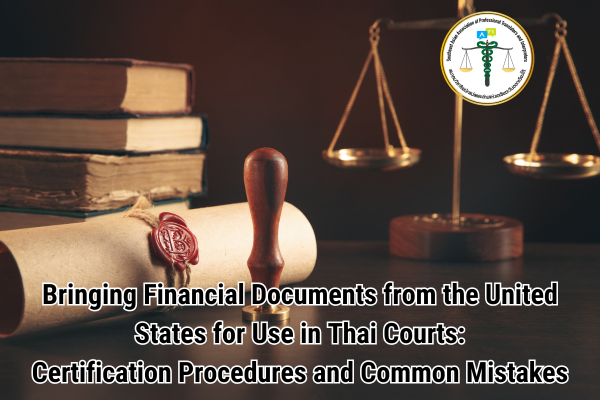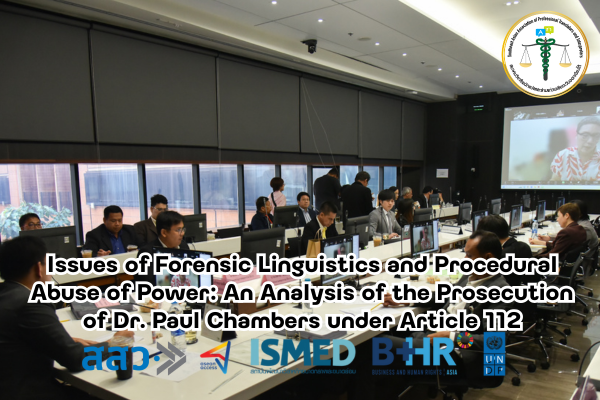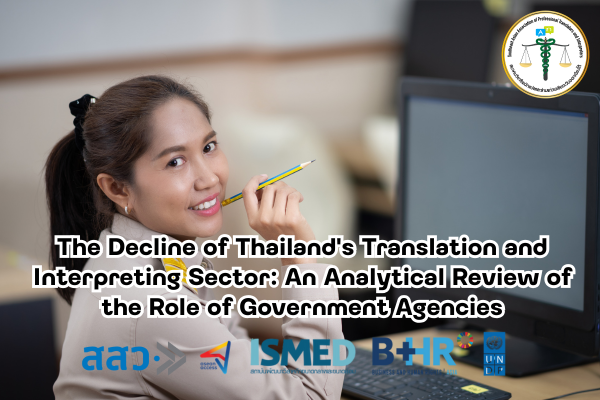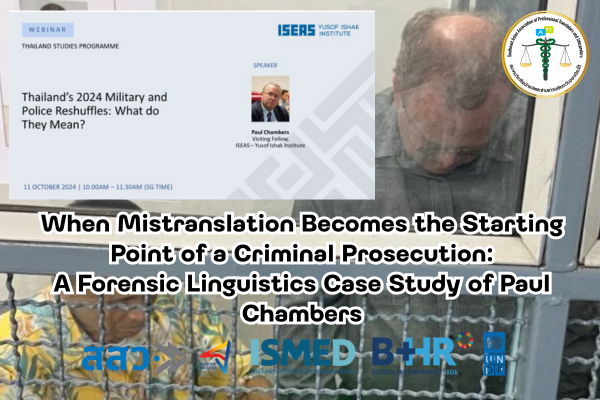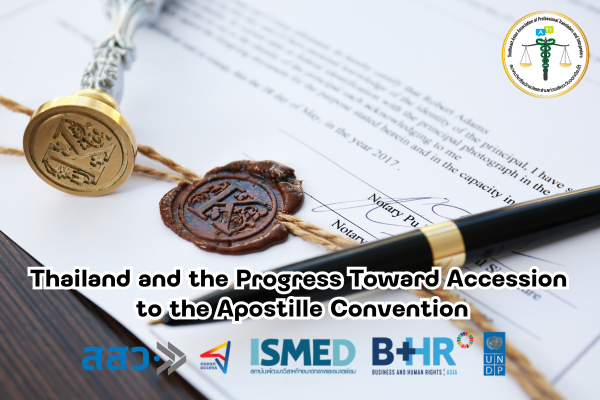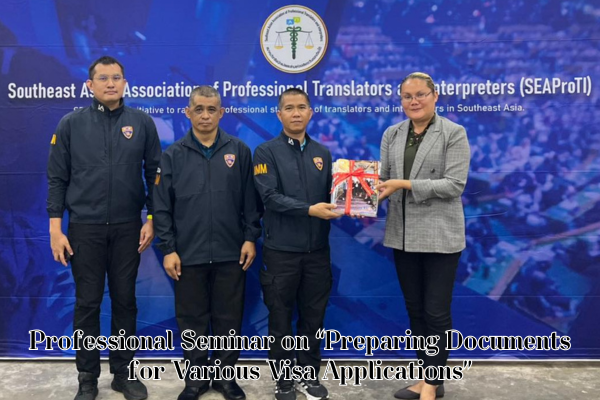Bringing Financial Documents from the United States for Use in Thai Courts:
Certification Procedures and Common Mistakes
Bringing financial documents from abroad for use in Thai courts requires certification from relevant authorities to ensure their legal validity and admissibility as evidence. This is especially true for documents from the United States, which must undergo multiple authentication steps. This article outlines the certification process and common mistakes to help individuals navigate this complex procedure correctly and efficiently.
Certification Process for U.S. Financial Documents for Use in Thai Courts
1. Certification in the United States
Financial documents issued by banks in the United States, such as bank statements, bank certificates, or other financial records, must be authenticated by the relevant authorities before they can be used in Thailand. The process involves the following steps:
-
Notarization: The document must first be notarized by a Notary Public in the United States to certify the signature of the bank officer or authorized person.
-
Certification by State Authority: The notarized document must then be authenticated by the Secretary of State in the state where the document was issued.
-
Authentication by the U.S. Department of State: After state-level certification, the document must be further authenticated by the U.S. Department of State Office of Authentications.
-
Legalization by the Thai Embassy/Consulate in the U.S.: Finally, the document must be legalized by the Royal Thai Embassy or Consulate in the United States before it can be accepted in Thailand.
2. Translation and Certification in Thailand
Since Thai courts operate in the Thai language, any financial documents in English must be translated into Thai. The translation process involves:
-
Translation by a Certified Translator – It is advisable to use a translator certified by the Southeast Asian Association of Professional Translators and Interpreters (SEAProTI), which ensures translation quality in Thailand.
-
Certification of Translation Accuracy – The translated document may need further certification by a law firm or an organization recognized by Thai courts to confirm its accuracy and validity.
3. Certification by the Thai Ministry of Foreign Affairs
Before the document can be used in a Thai court, it must undergo final certification by the Department of Consular Affairs, Ministry of Foreign Affairs of Thailand. The documents, which have been legalized by the Thai embassy or consulate in the U.S. and accurately translated into Thai, must be submitted for official endorsement by the Ministry of Foreign Affairs.
Common Mistakes in Certifying U.S. Financial Documents for Use in Thai Courts
1. Skipping Certification at the Thai Embassy in the U.S.
One of the most common mistakes is failing to obtain certification from the Royal Thai Embassy or Consulate in the U.S. before bringing the documents to Thailand. Without this step, the Thai Ministry of Foreign Affairs may reject the documents, rendering them inadmissible in court.
2. Relying Solely on Notary Public Certification
Although a Notary Public can authenticate signatures, Thai courts generally do not accept documents based solely on notary certification. Additional authentication from state authorities and the U.S. Department of State is required to ensure their validity.
3. Using an Uncertified Translation
If the translation is not done by a certified translator, Thai courts may reject it. To avoid this, translation should be performed by a SEAProTI-certified translator or another officially recognized professional to ensure acceptance.
4. Relying on Apostille Instead of Legalization
The United States is a signatory to the Hague Apostille Convention, which simplifies document authentication for member countries. However, Thailand is not a party to this convention. As a result, Apostille certification alone is insufficient, and documents must undergo full legalization through the Thai Embassy or Consulate in the U.S.
5. Submitting Electronic Documents Without Proper Authentication
Financial documents printed from an online banking system without an official bank stamp or signature from an authorized officer may not be accepted. Ensure that documents have an official signature or stamp before proceeding with the certification process.
Conclusion
Bringing financial documents from the United States for use in Thai courts involves multiple certification steps, including notarization, authentication by U.S. government authorities, legalization by the Thai Embassy, translation, and final endorsement by the Thai Ministry of Foreign Affairs. Understanding and following the proper procedures will help avoid delays or rejection in court proceedings.
For further guidance or assistance with document certification, consult legal professionals or certification agencies in Thailand to ensure your documents meet all necessary requirements and are legally recognized by Thai courts.
SEAProTI’s certified translators, translation certification providers, and certified interpreters:
The Southeast Asian Association of Professional Translators and Interpreters (SEAProTI) has officially announced the criteria and qualifications for individuals to register as “Certified Translators,” “Translation Certification Providers,” and “Certified Interpreters” under the association’s regulations. These guidelines are detailed in Sections 9 and 10 of the Royal Thai Government Gazette, issued by the Secretariat of the Cabinet under the Office of the Prime Minister of the Kingdom of Thailand, dated July 25, 2024, Volume 141, Part 66 Ng, Page 100.
To read the full publication, visit: the Royal Thai Government Gazette
การนำเอกสารทางการเงินจากสหรัฐอเมริกามาใช้ในศาลไทย:
แนวทางการรับรองและข้อผิดพลาดที่พบบ่อย
การนำเอกสารทางการเงินจากต่างประเทศมาใช้ในศาลไทยเป็นกระบวนการที่ต้องได้รับการรับรองจากหน่วยงานที่เกี่ยวข้อง เพื่อให้เอกสารมีผลทางกฎหมายและสามารถใช้เป็นหลักฐานในการพิจารณาคดีได้อย่างถูกต้อง โดยเฉพาะอย่างยิ่งเอกสารจากสหรัฐอเมริกา ซึ่งต้องผ่านกระบวนการรับรองหลายขั้นตอน บทความนี้จะอธิบายแนวทางการรับรองเอกสาร และข้อผิดพลาดที่พบบ่อยเพื่อช่วยให้ผู้ที่ต้องการนำเอกสารดังกล่าวมาใช้สามารถดำเนินการได้อย่างถูกต้องและครบถ้วน
กระบวนการรับรองเอกสารทางการเงินจากสหรัฐอเมริกาสำหรับใช้ในศาลไทย
1. การรับรองจากต้นทาง (สหรัฐอเมริกา)
เอกสารทางการเงินที่ออกโดยธนาคารในสหรัฐอเมริกา เช่น รายการเดินบัญชี (Bank Statement) หนังสือรับรองยอดเงินฝาก (Bank Certificate) หรือเอกสารทางการเงินอื่น ๆ ที่เกี่ยวข้อง จะต้องผ่านการรับรองจากหน่วยงานที่เกี่ยวข้องก่อนนำมาใช้ในประเทศไทย ดังนี้:
-
Notarization: ต้องนำเอกสารไปให้ Notary Public ที่อย๔่ภายใต้อนุสัญญา Hague Apostille Convention ในสหรัฐฯ รับรองลายเซ็นของเจ้าหน้าที่ธนาคารหรือผู้ที่มีอำนาจลงนามในเอกสาร
-
Certification by State Authority: จากนั้นเอกสารต้องได้รับการรับรองเพิ่มเติมจากหน่วยงานรัฐที่ดูแล Notary Public เช่น Secretary of State ของรัฐที่ออกเอกสาร
-
Authentication by U.S. Department of State: หลังจากที่ได้รับการรับรองจากรัฐแล้ว เอกสารจะต้องได้รับการตรวจสอบและรับรองจาก U.S. Department of State Office of Authentications โดยในส่วนนี้จะได้ Apostille มา
-
Legalization by the Thai Embassy/Consulate in the U.S.: สุดท้ายก่อนส่งเอกสารมาใช้ในไทย ต้องนำเอกสารไปให้ สถานเอกอัครราชทูตไทย หรือสถานกงสุลไทยในสหรัฐฯ ประทับตรารับรองเพื่อให้เป็นที่ยอมรับในประเทศไทย
2. การแปลและรับรองการแปลในประเทศไทย
เนื่องจากศาลไทยใช้ภาษาไทยในการดำเนินคดี เอกสารที่เป็นภาษาอังกฤษจะต้องแปลเป็นภาษาไทยก่อนนำมาใช้ โดยต้องผ่านการแปลที่ได้รับการรับรองดังนี้:
-
การแปลโดยนักแปลที่ได้รับการรับรอง – ควรเลือกใช้บริการนักแปลที่ได้รับการรับรองจาก Southeast Asian Association of Professional Translators and Interpreters (SEAProTI) ซึ่งเป็นองค์กรที่รับรองคุณภาพนักแปลในประเทศไทย หรือจะแปลโดยหน่วยงานที่มีอำนาจอื่น ๆ ก็ได้
-
การรับรองความถูกต้องของการแปล – เอกสารแปลอาจต้องได้รับการรับรองโดยสำนักงานกฎหมาย หรือองค์กรที่ศาลไทยยอมรับ เพื่อให้มั่นใจว่าเนื้อหาแปลถูกต้องตรงกับต้นฉบับ
3. การรับรองโดยกรมการกงสุลไทย
ก่อนที่เอกสารจะสามารถนำไปใช้ในศาลไทยได้ ต้องผ่านการรับรองขั้นสุดท้ายที่ กรมการกงสุล กระทรวงการต่างประเทศของไทย ซึ่งเป็นหน่วยงานที่มีอำนาจรับรองความถูกต้องของเอกสารจากต่างประเทศ โดยสามารถนำเอกสารที่ได้รับการรับรองจากสถานทูตไทยในสหรัฐฯ และการแปลที่ได้รับการรับรองไปยื่นขอประทับตราที่กรมการกงสุล
ข้อผิดพลาดที่พบบ่อยในการรับรองเอกสารทางการเงินจากสหรัฐฯ เพื่อใช้ในศาลไทย
1. ข้ามขั้นตอนการรับรองจากสถานทูตไทยในสหรัฐฯ
หนึ่งในข้อผิดพลาดที่พบบ่อยคือการไม่ได้ดำเนินการรับรองที่ สถานเอกอัครราชทูตไทย หรือสถานกงสุลไทยในสหรัฐฯ ซึ่งเป็นขั้นตอนสำคัญ หากไม่มีการรับรองจากสถานทูตไทย เอกสารอาจถูกปฏิเสธโดยกรมการกงสุลไทยและไม่สามารถนำมาใช้ในศาลได้
2. การใช้ Notary Public เพียงอย่างเดียว
แม้ว่า Notary Public จะเป็นหน่วยงานที่สามารถรับรองลายเซ็นในเอกสารได้ แต่ในกรณีของศาลไทย การรับรองจาก Notary Public อย่างเดียวไม่เพียงพอ ต้องได้รับการรับรองเพิ่มเติมจากหน่วยงานของรัฐและกระทรวงการต่างประเทศของสหรัฐฯ ด้วย
3. การแปลที่ไม่ได้รับการรับรอง
หากการแปลเอกสารไม่ได้ดำเนินการโดยนักแปลที่ได้รับการรับรอง ศาลไทยอาจไม่ยอมรับเอกสารดังกล่าว ดังนั้น ควรเลือกใช้บริการนักแปลที่ได้รับการรับรองจาก SEAProTI หรือองค์กรที่ศาลยอมรับ เพื่อให้เอกสารมีความน่าเชื่อถือ
4. การใช้ Apostille แทน Legalization
สหรัฐอเมริกาเป็นภาคีของอนุสัญญา Hague Apostille Convention ซึ่งช่วยให้เอกสารได้รับการรับรองระหว่างประเทศได้ง่ายขึ้น อย่างไรก็ตาม ประเทศไทยไม่ได้เข้าร่วมอนุสัญญานี้ ดังนั้น การใช้ Apostille เพียงอย่างเดียวไม่เพียงพอ จำเป็นต้องดำเนินการ Legalization ผ่านสถานทูตไทย
5. การใช้เอกสารอิเล็กทรอนิกส์โดยไม่มีการรับรองความแท้จริง
เอกสารที่พิมพ์ออกมาจากระบบออนไลน์ของธนาคารโดยไม่มีตราประทับหรือการรับรองลายเซ็นจากเจ้าหน้าที่ที่มีอำนาจอาจไม่ได้รับการยอมรับ ควรตรวจสอบให้แน่ใจว่าเอกสารมีลายเซ็นหรือตราประทับอย่างถูกต้องก่อนนำไปดำเนินการรับรอง
สรุป
การนำเอกสารทางการเงินจากสหรัฐอเมริกามาใช้ในศาลไทยเป็นกระบวนการที่ต้องผ่านหลายขั้นตอน ตั้งแต่การรับรองโดย Notary Public, รัฐบาลสหรัฐฯ, สถานทูตไทยในสหรัฐฯ, การแปลเอกสาร และการรับรองโดยกรมการกงสุลไทย ผู้ที่ต้องการใช้เอกสารดังกล่าวควรศึกษาแนวทางให้ละเอียดและเลือกใช้บริการจากนักแปลและหน่วยงานที่ได้รับการรับรองเพื่อหลีกเลี่ยงปัญหาในการดำเนินคดี
หากท่านต้องการข้อมูลเพิ่มเติมหรือความช่วยเหลือเกี่ยวกับการรับรองเอกสาร สามารถติดต่อผู้เชี่ยวชาญด้านกฎหมายหรือหน่วยงานรับรองเอกสารในประเทศไทยเพื่อให้มั่นใจว่าเอกสารของท่านจะได้รับการยอมรับจากศาลไทยอย่างถูกต้องและมีผลทางกฎหมาย
เกี่ยวกับนักแปลรับรอง ผู้รับรองการแปล และล่ามรับรองของสมาคมวิชาชีพนักแปลและล่ามแห่งเอเชียตะวันออกเฉียงใต้
สมาคมวิชาชีพนักแปลและล่ามแห่งเอเชียตะวันออกเฉียงใต้ (SEAProTI) ได้ประกาศหลักเกณฑ์และคุณสมบัติผู้ที่ขึ้นทะเบียนเป็น “นักแปลรับรอง (Certified Translators) และผู้รับรองการแปล (Translation Certification Providers) และล่ามรับรอง (Certified Interpreters)” ของสมาคม หมวดที่ 9 และหมวดที่ 10 ในราชกิจจานุเบกษา ของสำนักเลขาธิการคณะรัฐมนตรี ในสำนักนายกรัฐมนตรี แห่งราชอาณาจักรไทย ลงวันที่ 25 ก.ค. 2567 เล่มที่ 141 ตอนที่ 66 ง หน้า 100 อ่านฉบับเต็มได้ที่: นักแปลรับรอง ผู้รับรองการแปล และล่ามรับรอง


